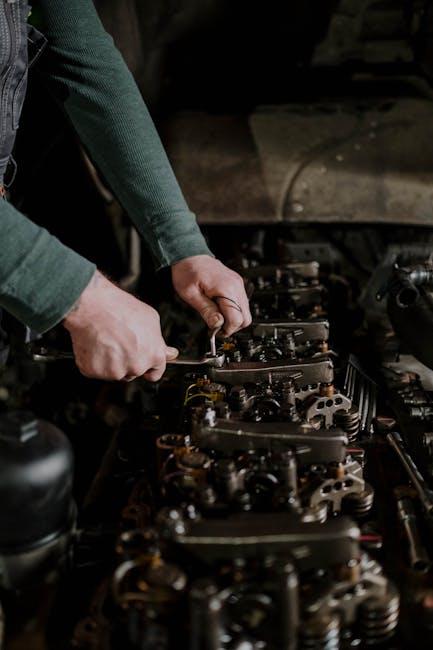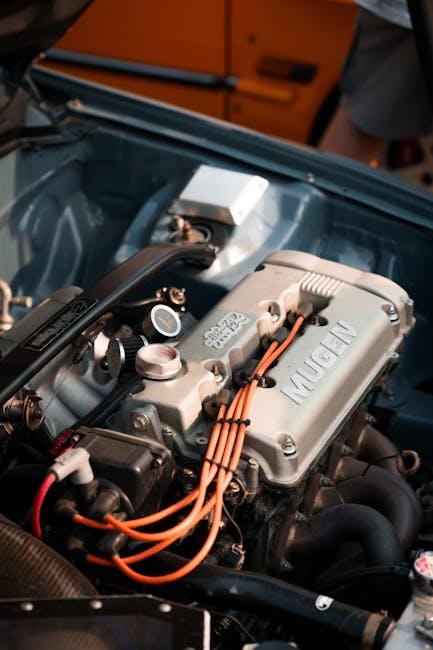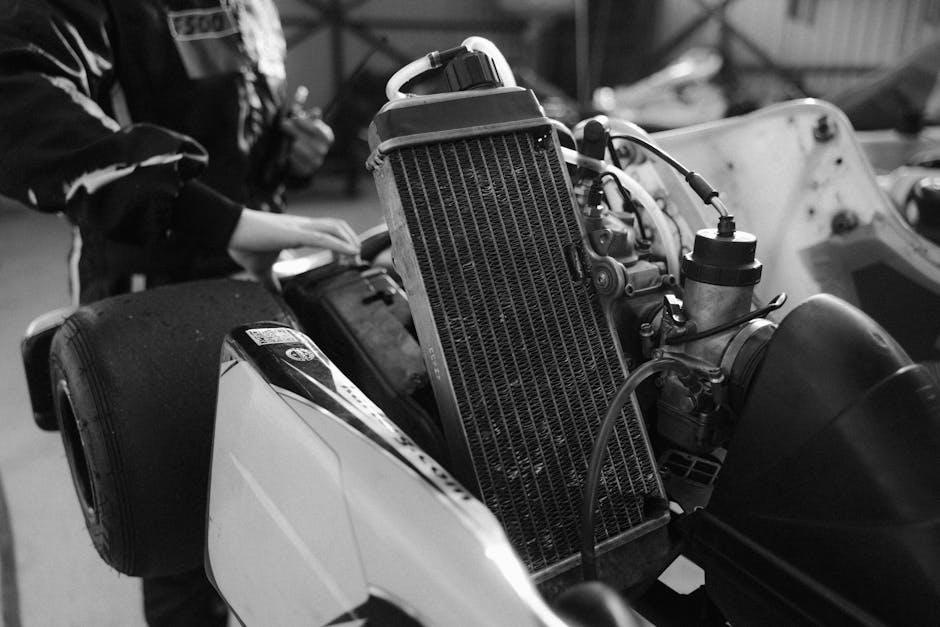Beneath the sleek exterior of every vehicle lies a complex heart—the engine—that powers every journey, big or small. Like any finely tuned instrument, it thrives on care and precision. Regular engine tune-ups are not just routine maintenance; they are the key to unlocking your car’s optimal performance, prolonging its life, and ensuring your safety on the road. In this article, we delve into why these periodic check-ups matter so much, exploring how they keep your engine humming smoothly and your driving experience worry-free.
Table of Contents
- The Role of Engine Tune-Ups in Maintaining Vehicle Performance
- Identifying Warning Signs That Indicate a Tune-Up Is Needed
- How Regular Tune-Ups Enhance Fuel Efficiency and Reduce Emissions
- Key Components Inspected and Replaced During a Tune-Up
- DIY Tune-Up Tips Versus Professional Maintenance Services
- Maximizing Engine Longevity Through Consistent Tune-Up Practices
- Q&A
- The Way Forward

The Role of Engine Tune-Ups in Maintaining Vehicle Performance
Engine tune-ups serve as the heartbeat of your vehicle’s optimal function. Regularly scheduling these tune-ups ensures that all engine components work harmoniously, minimizing wear and unexpected breakdowns. By focusing on critical areas such as spark plugs, air filters, and fuel systems, tune-ups help maintain fuel efficiency and reduce harmful emissions, ultimately extending the lifespan of your engine. Consistent attention to these details prevents minor issues from evolving into costly repairs, safeguarding your investment and delivering consistent power when you need it most.
Beyond simple maintenance, tune-ups also provide an opportunity to catch early signs of mechanical problems that may not yet be apparent during everyday use. During a comprehensive tune-up, mechanics perform a thorough diagnostic check, including timing adjustments and sensor evaluations, to optimize performance. Consider the following benefits that tune-ups bring to your vehicle:
- Improved fuel economy through precise air-fuel mixture calibration
- Smoother engine idle by ensuring spark plugs and ignition systems are in peak condition
- Reduced emissions contributing to a cleaner environment
- Enhanced acceleration as engine responsiveness is restored
| Tune-Up Component | Function | Maintenance Frequency |
|---|---|---|
| Spark Plugs | Ignite fuel-air mixture | Every 30,000 miles |
| Air Filter | Filters engine air intake | Every 15,000 miles |
| Fuel Filter | Prevents contamination in fuel system | Every 20,000 miles |
| Ignition Timing | Controls spark efficiency | During tune-up or diagnostic |

Identifying Warning Signs That Indicate a Tune-Up Is Needed
Recognizing the early signals your engine needs a tune-up can save you from costly repairs down the road. One common sign is a noticeable drop in fuel efficiency; if you’re filling up more often than usual, it’s time to investigate. Other indicators include rough idling or difficulty starting the engine, which suggest that spark plugs or ignition components may be wearing out. Additionally, if you experience unusual exhaust smoke or a prominent decrease in acceleration, these symptoms should not be ignored. Addressing these issues early helps maintain optimal engine performance and prolongs its lifespan.
Keep an eye out for the following specific warning signs:
- Engine misfires or stalls during acceleration or at idle
- Dashboard warning lights, especially the check engine light
- Strange noises such as knocking or pinging sounds
- Strong or unusual odors coming from the engine
| Warning Sign | Potential Cause | Recommended Action |
|---|---|---|
| Decreased Fuel Efficiency | Worn Spark Plugs | Replace Spark Plugs |
| Rough Idling | Dirty Air Filter | Clean or Replace Air Filter |
| Engine Stalling | Fuel System Issues | Inspect Fuel Injectors |
| Check Engine Light | Various Sensors | Diagnostic Scan |

How Regular Tune-Ups Enhance Fuel Efficiency and Reduce Emissions
Maintaining your engine through regular tune-ups ensures that every component performs at its peak, directly translating to improved fuel economy. When spark plugs, air filters, and fuel injectors are clean and in optimal condition, your engine burns fuel more efficiently, reducing waste. This not only saves you money at the pump but also lessens the frequency of refueling stops, making every drive smoother and more cost-effective.
Beyond saving fuel, tune-ups play a crucial role in minimizing harmful emissions released into the environment. A finely tuned engine emits fewer toxic gases such as carbon monoxide and nitrogen oxides by optimizing combustion. Consider the following benefits:
- Reduced carbon footprint through cleaner exhaust.
- Compliance with emissions regulations to avoid fines.
- Improved air quality contributing to healthier surroundings.
| Component | Impact on Fuel Efficiency | Effect on Emissions |
|---|---|---|
| Spark Plugs | Ensures proper ignition | Reduces unburnt fuel emissions |
| Air Filter | Optimizes air supply | Improves combustion quality |
| Fuel Injectors | Delivers precise fuel amount | Minimizes excess fuel release |

Key Components Inspected and Replaced During a Tune-Up
During a tune-up, several crucial components are carefully examined and, if necessary, replaced to ensure your engine runs smoothly and efficiently. Key parts include spark plugs, which ignite the air-fuel mixture in the combustion chamber; worn spark plugs can lead to misfires and reduced fuel economy. The air filter is inspected to confirm that your engine receives clean airflow, vital for optimal combustion. Additionally, the fuel filter is checked to prevent contaminants from reaching the fuel injectors, while the PCV valve (Positive Crankcase Ventilation) ensures proper ventilation of engine gases, reducing emissions and maintaining engine health.
Aside from these, the condition of the ignition wires is verified to guarantee efficient spark transmission, and the timing belt or chain is assessed for wear, as its failure can cause severe engine damage. Below is a simple overview of these components and their primary role in a tune-up:
| Component | Primary Role |
|---|---|
| Spark Plugs | Ignite air-fuel mixture |
| Air Filter | Provide clean airflow |
| Fuel Filter | Filter fuel impurities |
| PCV Valve | Vent engine gases |
| Ignition Wires | Transmit spark |
| Timing Belt/Chain | Synchronize engine timing |

DIY Tune-Up Tips Versus Professional Maintenance Services
When considering routine engine tune-ups, many car owners lean towards DIY methods for cost-saving and convenience. Simple tasks such as replacing spark plugs, air filters, or checking fluid levels can be managed with a few basic tools and some attention to the vehicle’s manual. These hands-on efforts can help maintain engine performance between professional visits, but they often lack the thoroughness that a trained technician provides. For instance, DIY enthusiasts might miss subtle signs of engine wear or fail to recalibrate systems after adjustments.
On the other hand, professional maintenance services offer a comprehensive approach backed by specialized diagnostic equipment and expert knowledge. Technicians can identify and address hidden issues, perform complex procedures like fuel injection cleaning, and ensure all components are within manufacturer specifications. The table below highlights key differences in scope and benefits between the two approaches:
| Aspect | DIY Tune-Up | Professional Service |
|---|---|---|
| Cost | Low | Higher |
| Thoroughness | Basic | Comprehensive |
| Tools Required | Minimal | Specialized |
| Diagnostic Capability | Limited | Advanced |
| Warranty Impact | Variable | Typically Maintained |
Choosing between DIY and professional tune-ups ultimately depends on your comfort level, vehicle complexity, and long-term maintenance goals. For basic upkeep, well-informed DIY work can keep a car running smoothly. However, to ensure optimal engine health and prevent costly repairs, regular check-ins with a professional mechanic remain indispensable.

Maximizing Engine Longevity Through Consistent Tune-Up Practices
Ensuring your engine performs optimally over the years hinges on maintaining a disciplined schedule of tune-ups. Regularly tuning your engine helps identify minor issues before they evolve into costly repairs. Key elements like spark plug replacement, air filter checks, and fuel system inspections directly contribute to smoother acceleration, better fuel economy, and reduced emissions. When these components are regularly inspected and adjusted, the engine operates within its ideal parameters, minimizing wear and tear caused by inefficient combustion or delayed ignition.
Incorporating consistent tune-up practices also means your vehicle sustains its power output and reliability, crucial for both everyday commutes and long road trips. As part of a well-rounded maintenance regimen, you should prioritize:
- Periodic timing belt or chain assessments
- Throttle body cleaning
- Checking fluid levels and quality (oil, coolant, transmission fluid)
- Monitoring sensor functions (oxygen and mass-air sensors)
Ignoring these steps can accelerate engine degradation, often resulting in premature failure and expensive repairs. A tune-up acts as preventive armor, ensuring your engine’s intricate systems run harmoniously and extend its operational lifespan.
| Maintenance Task | Frequency | Main Benefit |
|---|---|---|
| Spark Plug Replacement | Every 30,000 miles | Improves ignition efficiency |
| Fuel System Cleaning | Every 25,000 miles | Prevents clogging & boosts fuel economy |
| Air Filter Replacement | Every 15,000 miles | Enhances airflow & engine breathing |
| Timing Belt Inspection | Every 60,000 miles | Avoids catastrophic engine damage |
Q&A
Q&A: The Importance of Regular Engine Tune-Ups
Q1: What exactly is an engine tune-up?
A1: Think of an engine tune-up as a health check for your car’s heart—the engine. It involves inspecting, adjusting, and replacing key components like spark plugs, filters, and fluids to ensure the engine runs smoothly and efficiently.
Q2: Why should I bother with regular tune-ups?
A2: Regular tune-ups keep your engine in peak condition, preventing small issues from snowballing into costly repairs. They improve fuel efficiency, reduce emissions, and help maintain optimal performance, ultimately extending your vehicle’s lifespan.
Q3: How often should I get a tune-up?
A3: While it varies by car make and model, most experts recommend a tune-up every 30,000 to 60,000 miles. Checking your owner’s manual is key—some modern engines have different maintenance schedules.
Q4: Can skipping tune-ups damage my engine?
A4: Absolutely. Neglecting tune-ups can lead to clogged filters, worn spark plugs, and inefficient combustion, which may cause poor fuel economy, rough idling, and even engine misfires. Over time, this neglect can result in significant engine damage.
Q5: What are the signs that my engine needs a tune-up?
A5: Noticeable symptoms include reduced fuel efficiency, sluggish acceleration, engine hesitation, rough idling, or the check engine light flickering on. These are your engine’s way of signaling that it’s time for a tune-up.
Q6: Is a tune-up different from regular oil changes?
A6: Yes. Oil changes primarily focus on keeping your engine lubricated and free from contaminants, while a tune-up covers a broader range of maintenance tasks aimed at optimizing overall engine performance.
Q7: Can I do a tune-up myself, or should I hire a professional?
A7: Some basic tasks, like replacing air filters or spark plugs, are doable for handy car owners. However, a full tune-up often involves diagnostic tools and expertise best left to professionals to ensure everything is adjusted correctly.
Q8: How does a tune-up benefit the environment?
A8: By ensuring your engine runs efficiently, tune-ups reduce harmful emissions and improve fuel consumption, helping to lower your car’s environmental footprint.
Q9: What’s the bottom line on tune-ups?
A9: Regular engine tune-ups are an investment in your vehicle’s health. By keeping your engine tuned, you save money on fuel, avoid expensive repairs, and enjoy a smoother, more reliable ride. It’s a small step with big rewards.
The Way Forward
In the intricate dance of gears, pistons, and spark plugs that make your engine hum, regular tune-ups play the often unseen but vital role of the choreographer. They ensure every component moves in harmony, preventing discord that can lead to costly repairs or unexpected breakdowns. Embracing the routine care of your engine isn’t just about maintenance—it’s a commitment to longevity, efficiency, and the smooth journeys ahead. So, as you continue to navigate the roads of life, remember that a well-tuned engine is more than a machine; it’s the heartbeat of your adventure, deserving of attention and respect at every mile.

